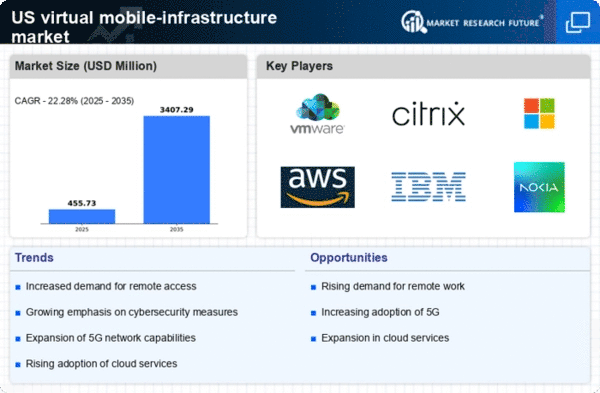Advancements in Mobile Technology
Technological advancements in mobile devices and networks are significantly influencing the virtual mobile-infrastructure market. The proliferation of 5G technology, for instance, is enhancing mobile connectivity and enabling faster data transfer rates. This advancement is likely to drive the adoption of virtual mobile-infrastructure solutions, as organizations seek to leverage high-speed networks for improved performance. Furthermore, the increasing capabilities of mobile devices, such as enhanced processing power and storage, are facilitating the deployment of sophisticated applications that rely on virtual mobile infrastructures. As a result, the market is poised for growth, with projections indicating a potential increase in market size by 25% over the next five years.
Growing Emphasis on Cost Efficiency
Cost efficiency remains a critical driver for the virtual mobile-infrastructure market. Organizations are increasingly seeking solutions that reduce operational costs while maintaining high performance. The implementation of virtual mobile infrastructures allows companies to optimize resource allocation and minimize hardware expenditures. Reports suggest that businesses can save up to 40% on IT costs by transitioning to virtual mobile solutions. This financial incentive is compelling many organizations to invest in virtual mobile-infrastructure systems, thereby propelling market growth. The focus on cost-effective solutions is likely to continue shaping the landscape of the virtual mobile-infrastructure market in the coming years.
Rising Demand for Remote Work Solutions
there is a notable surge in demand for remote work solutions. As organizations increasingly adopt flexible work arrangements, the need for robust mobile infrastructure becomes paramount. This shift is evidenced by a reported 30% increase in remote work adoption among US companies in the past year. Such a trend necessitates the deployment of virtual mobile-infrastructure systems that can support seamless connectivity and collaboration. Companies are investing in these solutions to enhance productivity and maintain operational efficiency, indicating a strong growth trajectory for the market. The virtual mobile-infrastructure market is thus positioned to benefit from this ongoing transformation in workplace dynamics.
Increased Regulatory Compliance Requirements
The virtual mobile-infrastructure market is also being shaped by heightened regulatory compliance requirements. As data protection laws become more stringent, organizations are compelled to adopt solutions that ensure compliance with regulations such as the CCPA and GDPR. This necessity drives the demand for virtual mobile-infrastructure systems that offer enhanced security features and data management capabilities. Companies are investing in these infrastructures to mitigate risks associated with non-compliance, which could result in substantial fines. Consequently, the virtual mobile-infrastructure market is likely to see increased adoption as businesses prioritize compliance and data security in their operational strategies.
Expansion of Internet of Things (IoT) Applications
The expansion of Internet of Things (IoT) applications is significantly impacting the virtual mobile-infrastructure market. As more devices become interconnected, the need for a robust mobile infrastructure to support these applications is becoming increasingly apparent. The virtual mobile-infrastructure market is poised to benefit from this trend, as organizations seek to implement solutions that can handle the data generated by IoT devices. With projections indicating that the number of connected IoT devices in the US could reach 30 billion by 2026, the demand for efficient mobile infrastructures is likely to grow. This trend suggests a promising outlook for the virtual mobile-infrastructure market as it adapts to the evolving technological landscape.

















